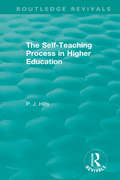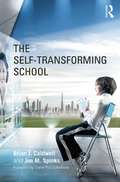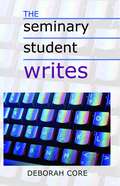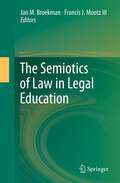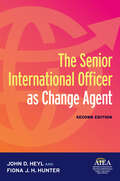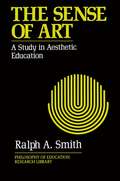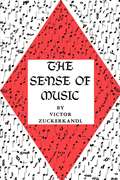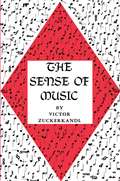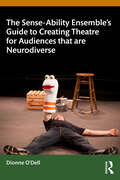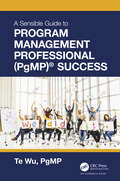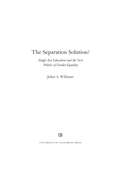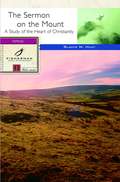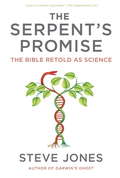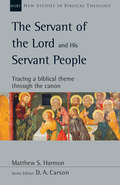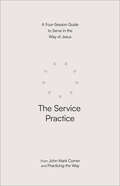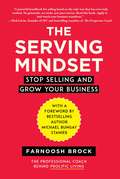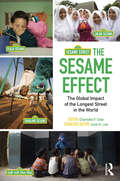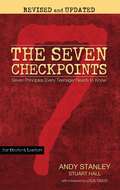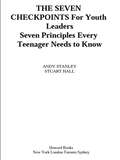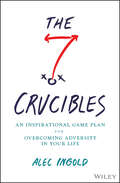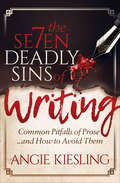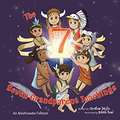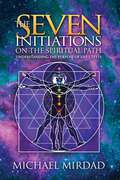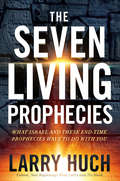- Table View
- List View
The Self-Teaching Process in Higher Education (Routledge Revivals)
by P.J. HillsOriginally published in 1976 The Self-Teaching Process in Higher Education looks at the major changes that took place in the structure of university education. The book looks at how more emphasis was placed on students to take responsibility for their own progress by becoming self-directed individuals. Traditional methods of university education and some alternative approaches are considered in light of course needs of both students and teachers. Self-teaching is then examined in the overall context of the learning process. The book looks at three case studies of the development and use of self-teaching systems, one for chemical bonding, one for electrical circuits and a third for audio-visual communication.
The Self-Transforming School
by Brian Caldwell Jim SpinksThe Self-Transforming School combines an insightful meta-analysis of factors contributing to the success of schools, and an examination of powerful mega-trends that are shaping developments in education, to offer the first mega-analysis in education policy and practice. The book spans fifty years, beginning with Caldwell and Spinks’ ground-breaking work The Self-Managing School which advocated innovative approaches that are now accepted as preferred practice, before offering a prognosis and plan for the future. The book argues that all schools in all settings can secure success for all students in an era where society and the economy are changing constantly and dramatically. Although schools find some support in local and global networks, externally designed re-structuring, re-staffing, or command-and-control direction isn’t sufficient to achieve transformation. Instead of replicating particular approaches to achieve modest improvement, leadership of the highest quality needs to be deeply embedded in schools and their systems. Caldwell and Spinks propose three important points that need to be taken into consideration:-schools are often at different stages of self-transformation -self-transformation requires a high level of professionalism, and must include teacher education and on-going professional development -funding is critically important, and efforts to build a capacity for self-transformation are constrained by what is available. The book gives particular attention to developments in Australia, Brazil, Canada, England, Finland, Hong Kong, India, New Zealand, Shanghai, Singapore and the United States. It will be of key interest to school leaders, policy makers, and academics and postgraduate students engaged in research on equity, student performance in highly disadvantaged settings and education policy.
The Seminary Student Writes
by Deborah CoreDeborah Core offers practical guidance for beginning seminary students who feel overwhelmed and under-prepared to write the number and quality of papers their courses require. The book begins with reflections on writing as a sacred action, then addresses such practical matters as choosing and researching a topic; outlining, drafting, and polishing a paper; and using the proper format for footnotes and bibliography. Also included are sample papers in MLA and Chicago styles and an overview of grammar and usage.
The Semiotics of Law in Legal Education
by Jan M. Broekman Francis J. Mootz IIIThis book offers educational experiences, including reflections and the resulting essays, from the Roberta Kevelson Seminar on Law and Semiotics held during 2008 - 2011 at Penn State University's Dickinson School of Law. The texts address educational aspects of law that require attention and that also are issues in traditional jurisprudence and legal theory. The book introduces education in legal semiotics as it evolves in a legal curriculum. Specific semiotic concepts, such as "sign", "symbol" or "legal language," demonstrate how a lawyer's professionally important tasks of name-giving and meaning-giving are seldom completely understood by lawyers or laypeople. These concepts require analyses of considerable depth to understand the expressiveness of these legal names and meanings, and to understand how lawyers can "say the law," or urge such a saying correctly and effectively in the context of a natural language that is understandable to all of us. The book brings together the structure of the Seminar, its foundational philosophical problems, the specifics of legal history, and the semiotics of the legal system with specific themes such as gender, family law, and business law.
The Senior International Officer as Change Agent
by John D. Heyl Fiona J. HunterPublished by Distributed by StylusThis new edition reflects the dramatic changes that have taken place across the world in higher education in the decade since it first was published, and addresses how they specifically impact international education and inform the role of senior international officer (SIO) today.Declining public investment in higher education and a negative political climate have increasingly led to the commercialization of international education activities and the expectation they should pay for themselves by levying fees or seeking outside funding. In addition, today’s international education leadership faces several contradictory realities. While inexorable trends in globalization continue to stimulate higher levels of participation in international study and exchange, its impacts – such as increased migration, global terrorism and the populist resistance they have provoked – are shifting institutional priorities from those of greater openness and global understanding to those of profitability and security.Facing these issues and the global competition for student talent at a time of declining enrollments; the impacts of technology; the increasing diversity on campus; pressures to partner across borders; changing emphases in institutional mission; and the expectations of both parents and students in gaining a global perspective during university studies, it’s clear that the key issue facing SIOs is managing change as colleges and universities seek to strengthen, professionalize, and centralize – or in some cases decentralize – their international offices.
The Sense of Art: A Study in Aesthetic Education (Philosophy of Education Research Library)
by Ralph A. SmithRalph A. Smith provides a theory of aesthetic education that addresses the need to revitalize the capacity for genuine judgment in society, reaffirm the ideal of excellence in culture, and reorder our thoughts about teaching the arts in schools. The book presents an image of the curriculum as itinerary, preparing the young to traverse the world of art with adroitness and sensitivity.
The Sense of Music
by Victor ZuckerkandlThis book is addressed to the listener whose enjoyment of music is filled with questions and whose curiosity makes him eager to grasp the sense of music, despite a lack of theoretical training. Unlike the usual listener's guide, which begins with a discussion of the elementary materials of music, this book starts with the elementary experiences of listening.
The Sense of Music
by Victor ZuckerkandlThis book is addressed to the listener whose enjoyment of music is filled with questions and whose curiosity makes him eager to grasp the sense of music, despite a lack of theoretical training. Unlike the usual listener's guide, which begins with a discussion of the elementary materials of music, this book starts with the elementary experiences of listening.
The Sense-Ability Ensemble’s Guide to Creating Theatre for Audiences that are Neurodiverse
by Dionne O'DellThe Sense-Ability Ensemble’s Guide to Creating Theatre for Audiences that are Neurodiverse is a practical handbook that explores how to create theatre for audiences that are neurodiverse.This book explores the journey of the Sense-Ability Ensemble in its quest to create theatre from the ground up for audiences that are neurodiverse. It demonstrates how to embark on this work, and how to move from a sensory-friendly model that adapts work to make it inclusive to a model that designs work with this specific audience in mind.This is accomplished through highlighting recommended practices, such as using live music, puppetry, and one-on-one audience member/actor interaction, exploring design considerations, sensory engagement, length, actor/staff training, non-linear storytelling, and the use of social narratives, as well as partnering with special education and occupational therapy professionals. It also offers practical suggestions for touring this theatre model, providing sample forms and methods of communication.Part case study, part how-to guide, this book will be of interest to theatre educators, practitioners, and students enrolled in courses on children’s theatre, devising, applied theatre, theatre for young audiences, and drama in education.
The Sensible Guide to Program Management Professional (PgMP)® Success
by Te WuA Sensible Guide to Program Management Professional (PgMP)® Success is for program managers preparing to take the PgMP exam based on The Standard for Program Management – 4th Edition (PgM4 Standard). It is designed for busy professionals whose responsibilities have taken them into the realm of coordinating, facilitating, managing, and leading programs. Program managers are leaders who are directly managing large amounts of project resources for their organizations. This study guide addresses three main concerns facing PgMP exam candidates: What are the essential concepts, processes, and tools that form the foundation of today’s program management? Since program management is still an emerging profession with professionals often working in different ways, what does this mean for a "standard" exam? More specifically, how does that impact your ability to pass the PgMP exam? What is the best way to prepare for the PgMP exam? To address the first concern, this book highlights the underlying rationale for program management: why it exists in organizations; why it is becoming ever more important; what programs are, especially for the purpose of passing the exam; how to think like a portfolio manager; and what the most important concepts, processes, and tools are for this profession. By simplifying complex ideas and communicating them in plain English with relevant examples, this book aims to help readers not only to pass the PgMP exam but also to serve as an essential guide for program managers. For the second concern, this book differs from other study guides by describing the author’s personal experience as a program manager and addressing the most pressing questions for each of the performance domains in The Standard for Program Management. To address the last concern, this book contains 420 practice questions, access to an online exam simulator and an online PgMP community, and a time-tested approach for passing the PgMP exam.
The Separation Solution?
by Juliet A. WilliamsSince the 1990s, there has been a resurgence of interest in single-sex education across the United States, and many public schools have created all-boys and all-girls classes for students in grades K through 12. The Separation Solution? provides an in-depth analysis of controversies sparked by recent efforts to separate boys and girls at school. Reviewing evidence from research studies, court cases, and hundreds of news media reports on local single-sex initiatives, Juliet Williams offers fresh insight into popular conceptions of the nature and significance of gender differences in education and beyond.
The Sermon on the Mount: A Radical Way of Being God's People (Fisherman Bible Studyguide Series)
by Gladys HuntIn these Bible studies, Gladys Hunt looks at the Sermon on the Mount, showing how Jesus' message encapsulates all of New Testament teaching on how to live the Christian life.
The Serpent's Promise
by Steve JonesA unique contribution to the God/religion debate: a scientific take on the Bible that doesn't take sides. Many of the subjects studied by physicists or by biologists are found in the texts of the world's religions: the origins of the universe, of life and of mankind; fate, sex, age and death; and the prospects of eternal life or of fiery doom. The Bible is a handbook for understanding Nature and, in its own way, it succeeds. As a factual account, of course, it is out of date, but many of its statements can be rephrased in modern terms. Distinguished geneticist Steve Jones has done that: written a rivetingly accessible work on recent advances in our understanding of ourselves, using the Bible as a framework. His narrative is structured around the Good Book's grand themes, from Genesis to Revelations, and weaves a series of unexpected facts into a coherent whole. The struggle of rationalism with its opposite has, after decades of torpor, returned to centre stage. Polemics against and in favour of religion and atheism fill the shelves. Instead of adding to that pile, Steve Jones stands back and take a fresh look at that issue in a volume that is not an attack or a defence but which explores scriptural motifs--Creation, the Garden of Eden, original sin, the Exodus, virgin birth, the Resurrection, and the Last Judgment--using the methods and results of the latest scientific research. It is a remarkably quick jump, shows Professor Jones, from Adam to astrophysics. Although some of the questions raised are beyond the capabilities of science, at least a scientist can ask them in a new way. Steve Jones shows there is a better route to understanding the universe than through doctrine.
The Servant of the Lord and His Servant People: Tracing a Biblical Theme Through the Canon (New Studies in Biblical Theology #Volume 54)
by Matthew S. HarmonIt is often recognized that the title "servant" is applied to key figures throughout the Bible, culminating in Jesus Christ. In this New Studies in Biblical Theology volume Matthew Harmon carefully traces this theme from Genesis to Revelation with the intention of seeing how earlier servants point forward to the ultimate Servant. While this servant theme certainly is significant in its own right throughout redemptive history, it also plays a supporting role, enhancing and enriching other themes such as son, prophet, and king. Harmon shows how the title "servant" not only gives us a clearer understanding of Jesus Christ but also has profound implications for our lives as Christians. When we grasp what it means to be servants of Christ, our love for him and our obedience to him deepen. Understanding that the ultimate Servant Jesus Christ indwells his people to empower them to serve others in love has the potential to transform how we interact with fellow believers and the world around us. Addressing key issues in biblical theology, the works comprising New Studies in Biblical Theology are creative attempts to help Christians better understand their Bibles. The NSBT series is edited by D. A. Carson, aiming to simultaneously instruct and to edify, to interact with current scholarship and to point the way ahead.
The Service Practice: A Four-Session Guide to Serve in the Way of Jesus
by John Mark Comer Practicing the WayDiscover how to serve with genuine love in a time of self-interest and overwhelming need through this guide from New York Times bestselling author John Mark Comer and the team at Practicing the Way.In a world where self-interest too often takes precedence, service is a defining characteristic of those who apprentice under Jesus. The Service Practice features a practical, accessible approach to integrating service to others into your daily life. Designed to be used with four engaging video sessions freely available online, this guide offers spiritual exercises, reflection questions, guided readings, and additional resources to help you and your community.This course guide will equip you to experience the power of a neglected discipline as you learn to:• Embrace a lifestyle of love and acting on behalf of others, following the example of Jesus• Imitate the radical availability of Jesus and reframe interruptions as invitations• Value community engagement and notice the needs of others around you• Practice intentional acts of service where you are, starting today, in your everyday lifeDiscover how a life of service can lead to a transformed heart, meaningful connections with others, and a deepened sense of purpose.Part of a series of nine core practices that together build a Rule of Life for following Jesus in the modern world, each guide can be read individually or together in any order:The Sabbath PracticeThe Prayer PracticeThe Fasting PracticeThe Solitude PracticeThe Generosity PracticeThe Scripture PracticeThe Community PracticeThe Service PracticeThe Witness Practice
The Serving Mindset: Stop Selling and Grow Your Business
by Brock FarnooshWhat if you could stop selling altogether and grow your profits? With The Serving Mindset, you’ll learn how to serve, elevate your business success, and feel great about it! Targeted to business owners and entrepreneurs who are very good at what they do but feel guilt and shame around selling and sales and therefore limit their own success and overall possibilities, The Serving Mindset: Stop Selling and Grow Your Business positions selling as serving and takes readers through the process of why and how to acquire this “serving mindset” and put it into practice. For readers who hate sales, The Serving Mindset will help you diagnose the source of the issue, understand how your mindset affects your sales directly, and discover a fresh approach to selling as serving—an essential lesson for enabling any business to explore maximum levels of prosperity. Using case studies as well as the experience of the author and that of her professional-coaching clients, The Serving Mindset is sure to change how readers view selling, serving, and growing. The powerful insights and applications in this book are game-changers for every business owner and entrepreneur who wants to attract and secure ideal customers and premium clients while maintaining integrity to his or her own core values.
The Sesame Effect: The Global Impact of the Longest Street in the World
by Charlotte F. Cole June H. LeeThe Sesame Effect details the wide-ranging work of Sesame Workshop and its productions across the world. With an emphasis on impact and evidence from research on projects in low- and middle-income countries, the book tells the stories behind the development of an international family of Muppet characters created for the locally produced adaptations of Sesame Street. Each chapter highlights the educational message of international co-productions and presents the cultural context of each project. Readers will understand the specific needs of children living in a given locale, as well as gain insight into the educational drivers of each project. These projects often deal with difficult issues, from race relations in the United States, to HIV/AIDS education in South Africa, to building respect across cultural divides in the Middle East. Readers will see how local productions have helped build a new mindset that values the importance of early childhood education, and how Sesame Street promotes a brighter future by building children’s academic skills, encouraging healthy habits, and by fostering attitudes that counter negative stereotypes and create appreciation of and respect for others. The Sesame Effect shows how, when magnified across the millions of children touched by the various international programs, Sesame Workshop and its projects are making a difference around the world.
The Seven Checkpoints for Student Leaders
by Stuart Hall Louie Giglio Andy StanleyThe Seven Checkpoints for Student Leaders is more than a book; it is a ministry plan. It goes far beyond the "how to" of youth ministry and provides youth ministers, youth works, and parents with the content that students need to equip them for 'life beyond youth group." The material in this book and the companion book The Seven Checkpoints Student Journal reveals what Stanley calls "the irreducible minimum"--the essential principles upon which an entire youth ministry can be built. Stanley and Hall offer some unorthodox but very sensible approaches to planning and maintaining a youth group over a long period of time with a specific goal in mind. The book outlines a strategy for effectively teaching students over the course of their time in school, and this new updated edition is what every leader needs to keep up with the ever-changing challenges students face. Stanley and Hall identify seven "checkpoints" that are the most important and critical issues facing teens: 1. Authentic Faith 2. Spiritual Disciplines 3. Moral Boundaries (this section deals primarily with issues of sexual purity and dating) 4. Healthy Friendships 5. Wise Choices 6. Ultimate Authority 7. Others FirstPractical application, biblical principles, and realistic approaches for facing modern challenges facilitate teaching for busy youth leaders that will make an impact for eternity.
The Seven Checkpoints for Student Leaders: Seven Principles Every Teenager Needs to Know
by Stuart Hall Louie Giglio Andy StanleyThe Seven Checkpoints for Student Leaders is more than a book; it is a ministry plan. It goes far beyond the "how to" of youth ministry and provides youth ministers, youth works, and parents with the content that students need to equip them for 'life beyond youth group." The material in this book and the companion book The Seven Checkpoints Student Journal reveals what Stanley calls "the irreducible minimum"--the essential principles upon which an entire youth ministry can be built. Stanley and Hall offer some unorthodox but very sensible approaches to planning and maintaining a youth group over a long period of time with a specific goal in mind. The book outlines a strategy for effectively teaching students over the course of their time in school, and this new updated edition is what every leader needs to keep up with the ever-changing challenges students face. Stanley and Hall identify seven "checkpoints" that are the most important and critical issues facing teens: 1. Authentic Faith 2. Spiritual Disciplines 3. Moral Boundaries (this section deals primarily with issues of sexual purity and dating) 4. Healthy Friendships 5. Wise Choices 6. Ultimate Authority 7. Others FirstPractical application, biblical principles, and realistic approaches for facing modern challenges facilitate teaching for busy youth leaders that will make an impact for eternity.
The Seven Checkpoints for Youth Leaders
by Stuart Hall Andy StanleyImagine meeting with the parents of your students and showing them the seven principles that serve as the foundation for all you will teach your kids. Imagine having a content calendar that can be used to guide the development of your activity calendar throughout the year. Imagine having a handful of carefully crafted principles to choose from in developing the theme of every camp of retreat. These are just a few of the advantages of adopting the seven-checkpoints strategy. But the greatest advantage is this: You will know that you are doing more than providing exciting activities -- you are changing lives for eternity. A New Strategy for Youth Ministry Andy Stanley and Stuart Hall, both respected and effective leaders in the Christian Community, have developed a ground-breaking, dynamic plan for youth ministry of the coming decades. The Seven Checkpoints for Youth Leaders and the companion The Seven Checkpoints Student Journal presents a plan for a student's entire career in a youth group. The challenges facing our youth grow every year. Quick fixes and short-term programs will not provide the life-strengthening results needed for the teens of today. This revolutionary approach promises and delivers what is needed in the world of youth ministries around the country today. So what are you waiting for? You have a life to build. Open up this book and get the seven.
The Seven Crucibles: An Inspirational Game Plan for Overcoming Adversity in Your Life
by Alec IngoldLive up to your definition of greatness and inspire the best in the people around you. In The Seven Crucibles: An Inspirational Game Plan for Overcoming Adversity in Your Life, NFL fullback and motivational speaker Alec Ingold delivers a hands-on playbook for conquering every obstacle that stands between you and success, on the playing field and in life. You'll learn to utilize your own story of trials and tribulations to help embrace the changes to create future success. These lessons will help you face your biggest fears and sustain motivation on your path to personal and professional growth. In the book, you'll find: A set of practical tools the author used to climb to the top of one of the most punishing arenas in global athletics and lessons for applying them to your everyday life Strategies for creating a mindset that rewards resilience and perseverance, and leaves unrealistic perfectionism behind Ways to reflect on your own accomplishments and shortcomings to help you learn from the past and build the future you want An essential resource for students and professional athletes, The Seven Crucibles will also earn a place on the bookshelves of business, military, academic, government, and educational leaders hoping to coax the best out of themselves and the people they lead.
The Seven Deadly Sins of Writing: Common Pitfalls of Prose . . . and How to Avoid Them
by Angie KieslingA book editor with decades of publishing experience shows writers how to avoid mistakes in this quick, whimsical guide. This concise guidebook borrows the idea of the Seven Deadly Sins from the Middle Ages and applies it to the craft of writing—revealing seven &“Deadly Don&’ts&” that the author, a veteran book editor, has encountered time and time again in writers&’ work. In addition to showing you how to avoid those all-too-common mistakes, she provides a &“Divine Do&” for each, offering useful take-aways writers can use to communicate more clearly and effectively, whether they&’re working on a masterpiece-in-progress or just want to sharpen their everyday writing skills.
The Seven Grandparent Teachings: An Anishinaabe Folktale Kindle
by Christine DelilloThese Seven Gifts or Grandparent Teachings of Love, Wisdom, Respect, Courage, Honesty, Humility, Truth and the animals that represent them are denoted in this book.
The Seven Initiations on the Spiritual Path: Understanding the Purpose of Life's Tests
by Michael MirdadMichael Mirdad has written a book that can assist us all on the path to wholeness, and help us live a life of balance and peace. By using life&’s little lessons and tests also called initiations, Dr Mirdad explains that as we learn, we open our hearts and our souls connection to God becomes stronger. As this happens we move closer to a more spiritual and enlightened life. The seven basic initiations involve different parts of ourselves from our bodies, minds, emotions and spirit. This book is not only to be read, but experienced. The message is to take those triumphs and tragedies of life and use them as pavers to continue to build our road to peace and happiness.
The Seven Living Prophecies: What Israel and End-Time Prophecies Have to Do With You
by Larry HuchThe missing piece to God&’s end-time plan is you. Through more than forty years of ministry, Pastor Larry Huch has seen a trend: Christians are living well below the promises and covenants of God. He says they are missing out in part because they don&’t fully understand where we are on God&’s biblical timeline. In this timely book, Huch, a respected teacher on the Hebrew roots of the Christian faith, reveals seven Bible prophecies unfolding right now that will release God&’s end-time outpouring of supernatural blessings and miracles into the world and into our lives. Every day ancient prophecies are unfolding in the world. Prophecies that we have read about but could only imagine are actually becoming reality in our lifetime. In every realm and sphere of life the missing pieces are coming together. What was sketchy and vague in the past is becoming crystal clear right before our eyes! In The Seven Living Prophecies, Huch uncovers these ancient Bible prophecies, mysteries, secrets, and hidden truths that are coming to pass and ushering us into the great outpouring of God in the last days, the rebuilding of the tabernacle, the latter rain of miracles, and the coming of the Messiah!This book will draw you to the Jewish roots of your faith so that you can experience the blessings that God prophesied.
